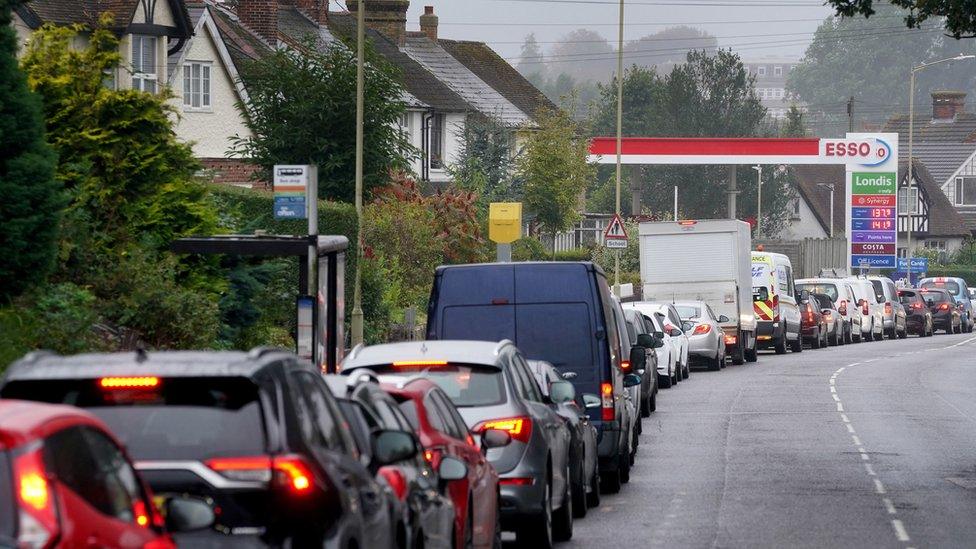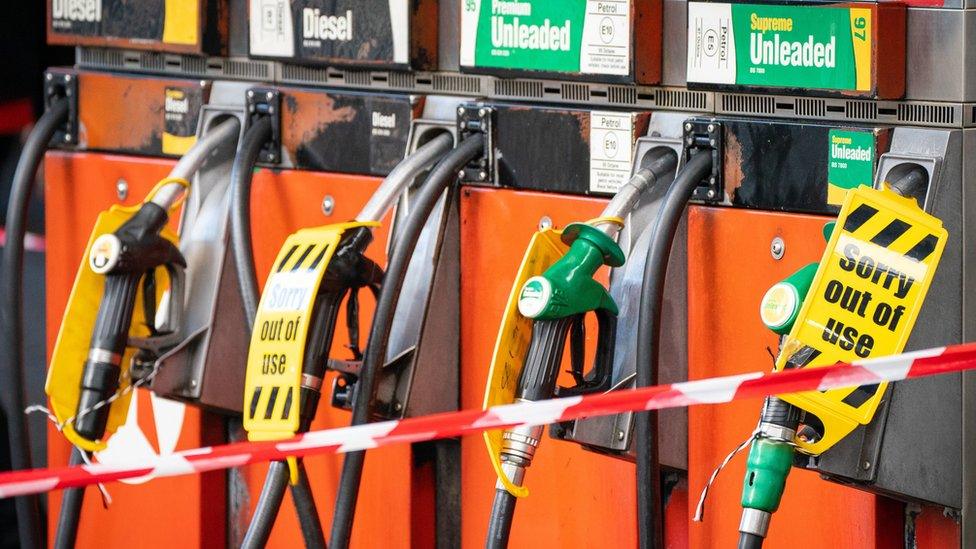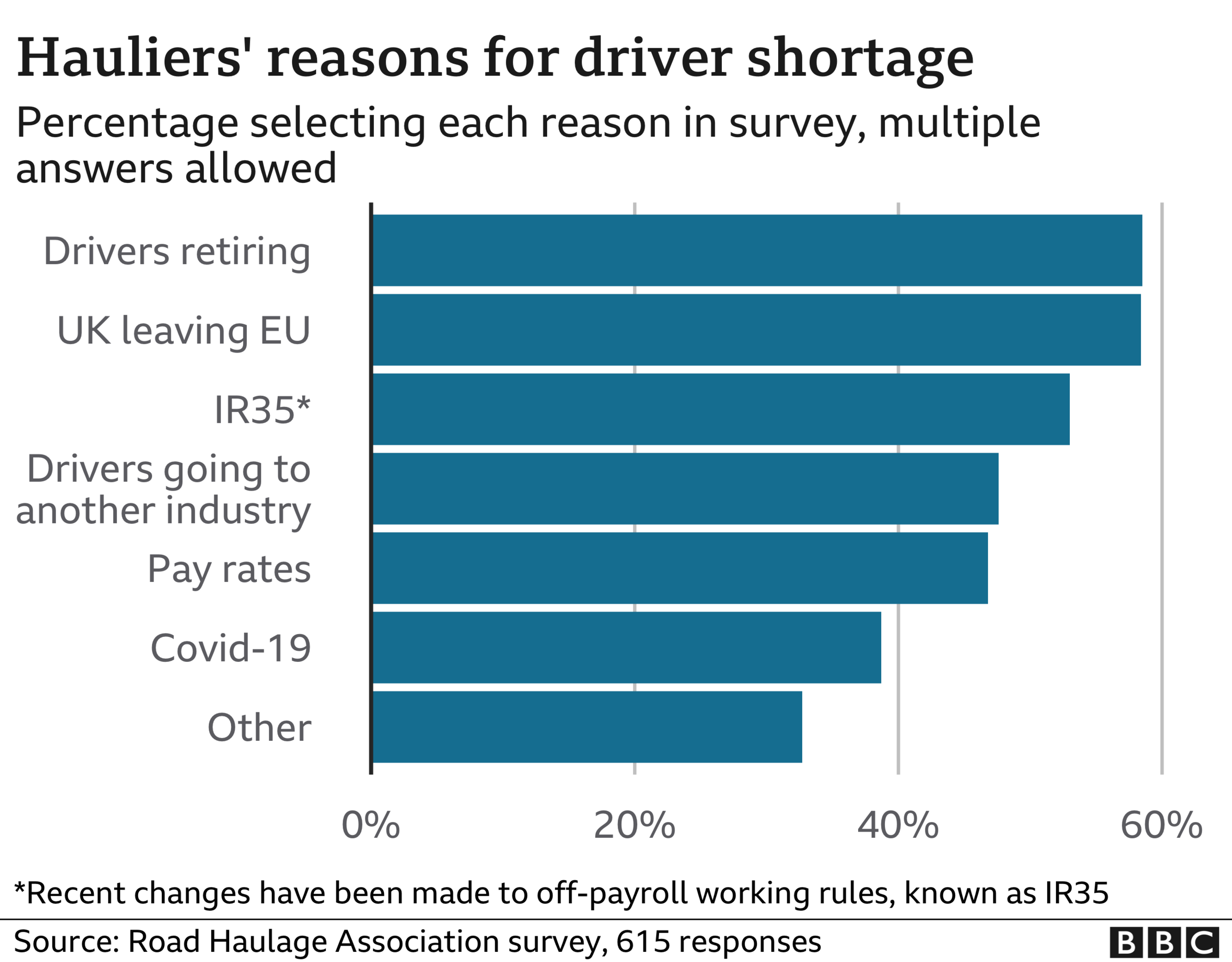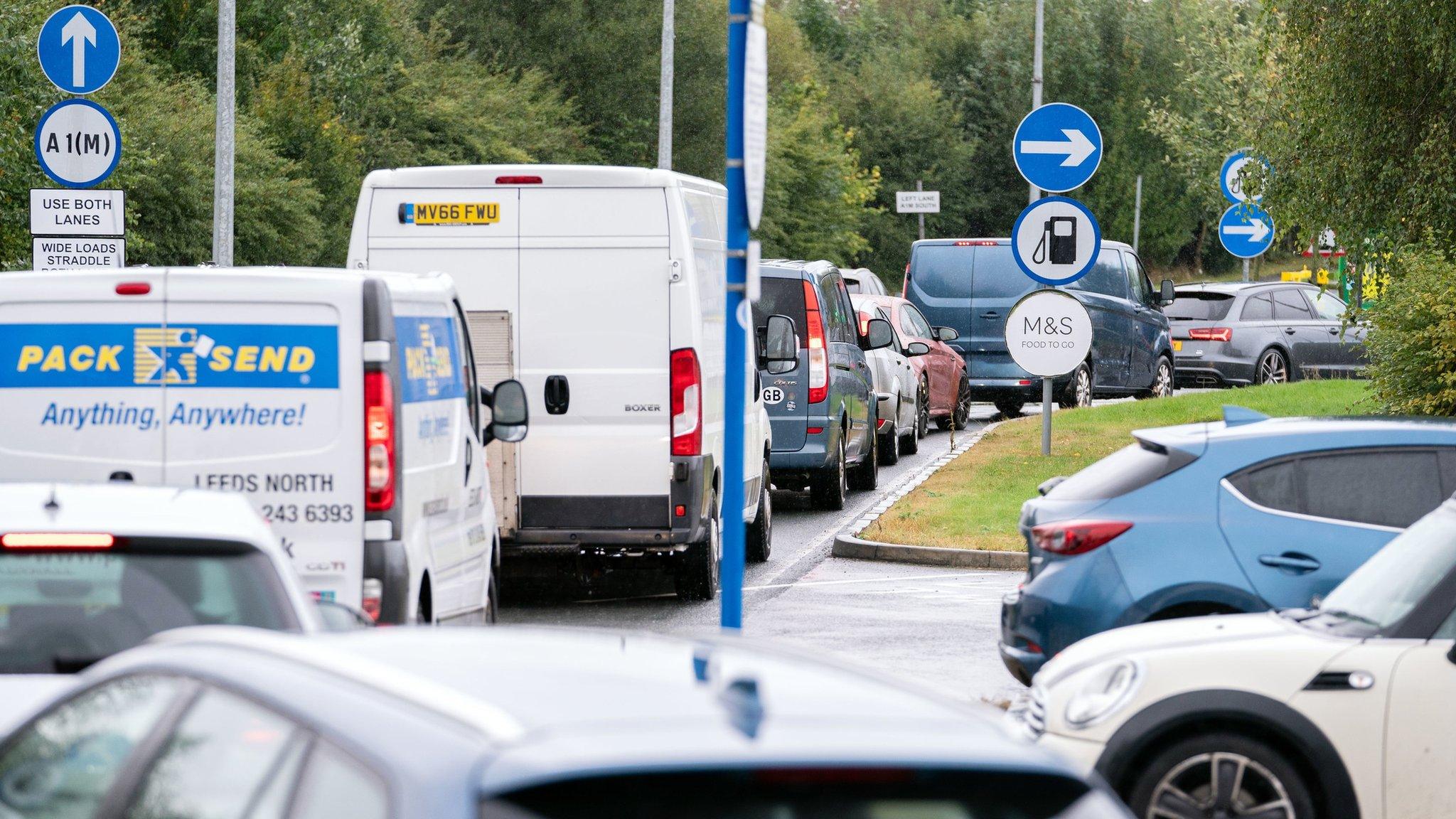Fuel supply: Military to deliver petrol to UK garages from Monday
- Published

Armed forces personnel will begin delivering petrol to garages across the UK from Monday, the government says.
Almost 200 servicemen and women, 100 of them drivers, will provide "temporary" support to ease pressure on stations.
Ministers have also announced that up to 300 overseas fuel tanker drivers will be able to work in the UK immediately until the end of March.
There have been long queues at petrol stations this week after a shortage of drivers disrupted fuel deliveries.
Ministers - who have maintained there is enough fuel if people buy at their normal rates - say the situation at petrol station forecourts is improving, with more fuel now being delivered than sold.
But they acknowledge some parts of the country are worse affected than others.
Brian Madderson, chairman of the Petrol Retailers Association, which represents nearly 5,500 of the UK's 8,300 petrol stations said Scotland, the north of England and parts of the Midlands had seen a "distinct improvement" with fewer dry sites.
But he told BBC Radio 4's Today programme it remained a "big problem" in London and south-east England, where "if anything it had got worse."
He said the military drivers will be a "large help" but a "prioritisation of deliveries to filling stations, particularly the independent ones, which are the neighbourhood sites" was needed "immediately".
Mr Madderson warned drivers would see a rise in fuel prices next week, but because of "global factors" not because of profiteering.
On Friday, the RAC motoring group also said the disruption in deliveries was continuing to ease, though many areas were still experiencing supply issues.
Smaller fuel stations were facing major supply problems as drivers filled up for the weekend, it said.
'No shortage of fuel'
Military personnel are currently training at haulier sites and will be on the road delivering fuel supplies across the country to "help fuel stocks further improve" from Monday, the government said.
Defence Secretary Ben Wallace said personnel would be seen working alongside drivers this weekend following training this week.
In addition to the 300 fuel tanker drivers being allowed to work temporarily in the UK, temporary visas are also being offered to 4,700 food haulage drivers who are able to arrive from late October and leave by 28 February 2022.
Visas are being offered to a further 5,500 poultry workers who can come from late October and stay until 31 December.
Previously, the government said these temporary visas would last until Christmas Eve.
Business Secretary Kwasi Kwarteng said there were "continued signs that the situation at the pumps is slowly improving".
"UK forecourt stock levels are trending up, deliveries of fuel to forecourts are above normal levels, and fuel demand is stabilising," he said.
"It's important to stress there is no national shortage of fuel in the UK, and people should continue to buy fuel as normal."

Analysis
By political correspondent Pete Saull
More than a week after queues started appearing on petrol station forecourts, just under 200 military personnel will take to the roads.
Ministers say it takes time to train up servicemen and women to drive large tankers carrying highly flammable substances into built-up areas.
While they will help with getting supplies to garages, there's been a concern inside government that falling back on the armed forces could be counter-productive.
What message does it send to worried motorists to see soldiers driving petrol tankers? Could it lead to more panic buying?
Ministers are confident the situation will continue to stabilise, but they've been under pressure to take more urgent action.
It's notable that alongside the decision to deploy the military, up to 300 tanker drivers will be allowed into the UK from overseas immediately - several weeks before the wider visa scheme comes into effect.


Labour leader Sir Keir Starmer called on the PM to recall Parliament from party conference recess, saying "emergency action" was needed to speed up the visas.
But Prime Minister Boris Johnson accused the haulage industry of being too reliant on low-paid migrant workers.
He added that he would not allow the UK to repeat the "failures" of the past, by allowing mass immigration to create a "low-wage, low-skill economy" for British workers.
The haulage industry says the driver shortage already existed, but has been made worse by factors including the pandemic, Brexit, an ageing workforce, low wages and poor working conditions.

A survey from earlier this year suggests a number of reasons for the driver shortage
In addition to offering temporary visas, the government last week set out a number of other measures aimed at limiting disruption in the run-up to Christmas and beyond.
These include increasing HGV (heavy goods vehicle) testing capacity, sending nearly one million letters to drivers who hold an HGV licence, encouraging them back into the industry, and offering training courses for HGV drivers.
Meanwhile, Chancellor Rishi Sunak has warned there is global disruption to supply chains in other industries, which could continue until Christmas.
"These shortages are very real," Mr Sunak told the Daily Mail, external. "We're seeing real disruptions in supply chains in different sectors, not just here but around the world. We are determined to do what we can to try to mitigate as much of this as we can."
And the Financial Times reports, external that turkeys will be imported to the UK from France and Poland in the run-up to Christmas after farmers reared about one million fewer birds.
British Poultry Council chief executive Richard Griffiths told the paper that Brexit had cut off the industry's supply of cheap labour.
- Published28 September 2021
